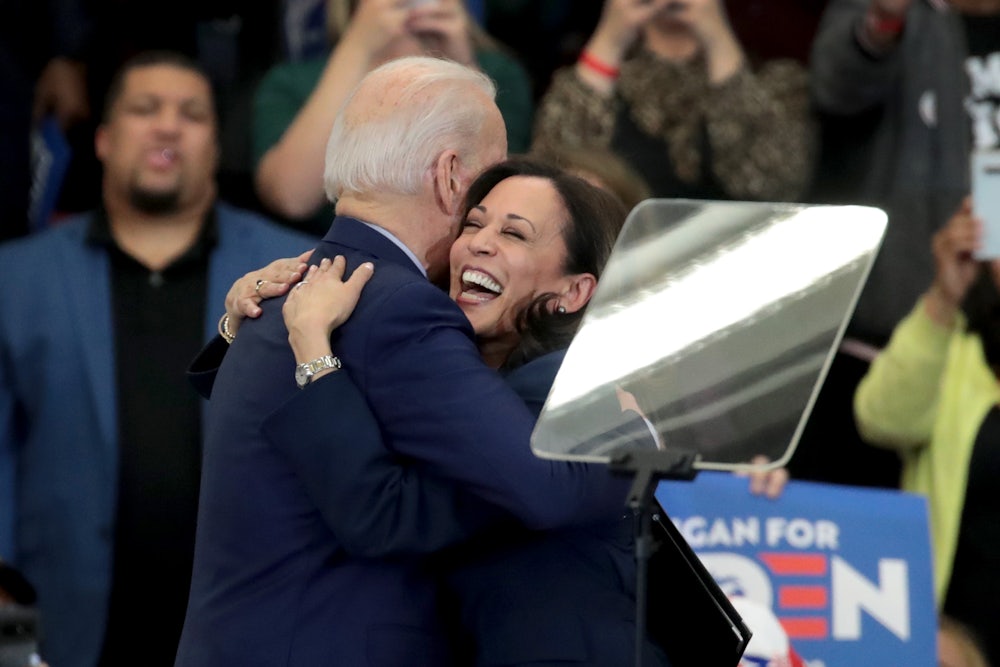What many forget about Kamala Harris’s presidential campaign was that, for the most part, she was a happy warrior. Sure, her slash-and-burn attack on Joe Biden over busing in their first debate last June has become seared in our brains through constant repetition on cable TV.
But that was the exception.
What I remember is a different and more upbeat candidate on the campaign trail, a senator who gleefully laughed at her own jokes. In a speech to a largely Black audience in Florence, South Carolina, in early July of last year, Harris talked about how everyone was “going through individual and group therapy,” trying to grasp what Donald Trump was doing to America.
Instead of rage, Harris offered her own version of hope: “We’re going to be fine.” She harked back to the Founding Fathers and their concept of checks and balances as she stressed, “This is a nation that was founded anticipating a moment just like this.” And her dramatic example was the late John McCain casting a crucial Senate vote to break with Trump and Republican orthodoxy to save the Affordable Care Act.
This is a view of politics that Biden shares. They believe that not all Republicans are beyond salvation—and that our democracy and our values can be saved through individual acts of courage like McCain’s.
Many volumes will be written about why Biden chose Harris. But the truest bond between them may be the simplest: They are both politicians in the best sense of the word. They understand elections, Capitol Hill, and how to be tough without losing your sense of humor.
Harris, of course, was always the obvious vice presidential choice who, in the cliché of the moment, checked all the boxes. She is a woman of color, who chose to attend Howard University rather than following the Barack Obama path to the Ivy League. As both a district attorney and California attorney general, she has a strong enough prosecutorial background to help fend off Trump’s attempts to portray the Democratic Party as the electoral branch of antifa. And having run for president, she does not need weeks of introduction and buildup to be a credible VP candidate.
Harris was never a particularly strong presidential candidate in her own right. Her campaign was unfocused and erratic. It ended when she ran out of money two months before the Iowa caucuses. Her critics claim that she was powered by ambition and little else (though the same could have been said of Biden when he first ran for president in 1987). But she does boast instant credibility: If, God forbid, something were to happen to Biden, she would be a plausible president. Only two of the other women Biden was considering could have said the same; and former national security adviser Susan Rice has never run for public office, and Elizabeth Warren is 71, no matter how vibrant she appeared as a candidate.
Both political science research and a gimlet-eyed look at recent history suggest that a vice presidential pick has limited electoral significance. What Biden wanted to avoid at all costs was causing any kind of distraction with his VP choice. He also wanted to avoid sending the press pack off to rummage through the political history of a little-known running mate. That is what happened with Karen Bass, who chairs the Congressional Black Caucus, when reporters discovered that she had volunteered to cut sugar cane in Cuba in the early 1970s, a youthful odyssey that seemed to suggest some naiveté about Fidel Castro’s regime.
One of the biggest misconceptions surrounding the Harris pick is that she will now be on a glide path to the 2024 nomination. In reality, Harris, whose own ideological orientation can be blurry, may get caught in the ideological battles that are likely to be waged if Biden doesn’t run for a second term. And her relationship with Biden may prove to be a liability if Biden struggles to contain the ongoing pandemic or to pull the country out of a deep recession.
What is surprising about Biden’s choice was Trump’s scattershot reaction. Since Harris was the obvious pick, one might think that the Trump team would have an elaborate game plan ready to roll out as soon as she was announced. Instead, Trump merely called her “nasty” for her questioning of Brett Kavanaugh during his confirmation hearings (horrors), and the campaign rushed out an uninspired ad about “Slow Joe and Phony Kamala.”
(Admittedly, even a president as proudly amnesiac as Trump may have a difficult time explaining why he donated $6,000 to Harris’s campaign fund as attorney general. And why Ivanka kicked in another $2,000 in 2014.)
Maybe the boldest aspect of the Harris choice is that she will make history by becoming not only the first Black woman and the first Asian American woman to grace the national ticket but also the first Democrat from the West Coast. She also fits the odd Democratic tradition of almost always picking a senator for vice president since there have been only two exceptions to that iron rule since Senator Harry Truman was nominated in 1944.
As important as Vice President Harris may be when it becomes time for President Biden to govern, the ideal campaign outcome would be if she aces her debate with Mike Pence and helps at the margins in mobilizing African American turnout. In choosing Harris, Biden followed the shrewd political strategy of doing nothing to prevent this election from becoming an up-or-down referendum on Donald J. Trump.
